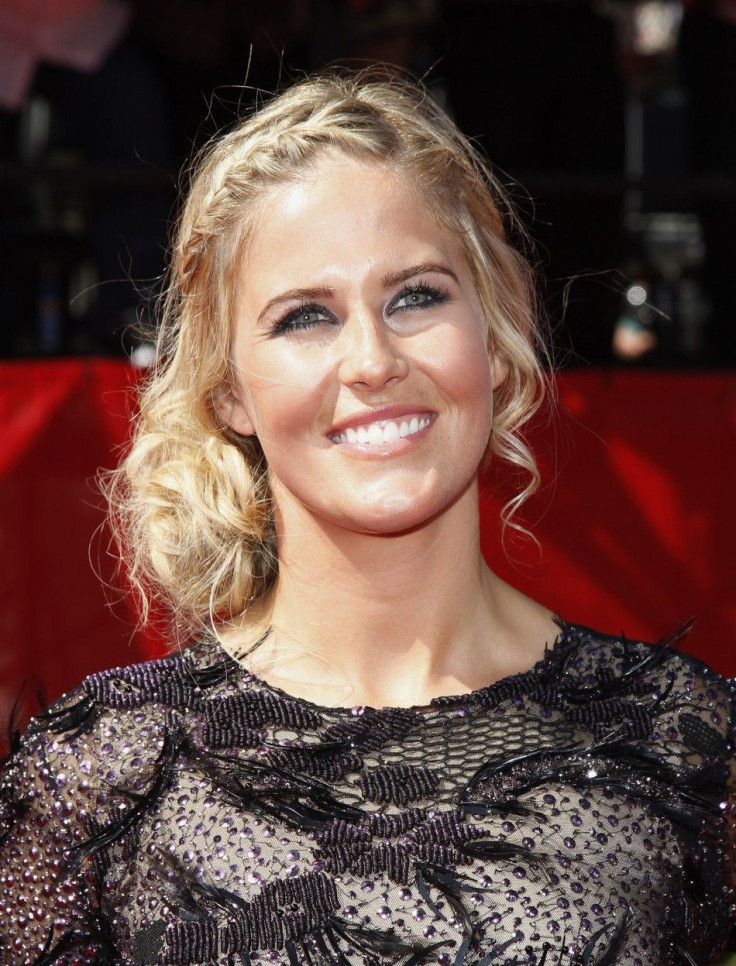Sarah Burke Still in Coma: Is Freestyle Skiing Too Dangerous?

Update: Sarah Burke has died from her skiing injuries, officials confirmed in a statement today. For more details, click here.
Canadian freestyle skier Sarah Burke remains in a coma this morning, and her family, who had planned to hold a Monday news conference with updates on her condition, canceled all press appearances after hearing from Burke's doctors.
Burke, 29, is a four-time superpipe Winter X Games champion and 2005 halfpipe world gold medalist. Last Tuesday, shortly after landing a practice run trick on the halfpipe ramp at the Park City Mountain Resort, Utah, the skier crashed and whiplashed onto her side.
Surgeons found she had torn her vertebral artery, causing massive cranial bleeding, and put Burke into a medically induced coma. The freestyle skier went into cardiac arrest immediately after the accident, and it is unclear what the results of Sarah Burke's most recent medical tests have been.
As fans wait to hear the results, however, some are viewing her injuries, and the crash itself, as enough reason to re-examine freestyle skiing, and to question whether or not the extreme sport is too dangerous for athletes, especially now that the Olympics Committee has added the sport to its roster for 2014.
'There's a desire to push the envelope.'
When the International Olympic Committee announced last spring that it would add freestyle skiing or freeskiing to the 2014 Sochi Games, reaction from the sports world was mixed, largely because they fear about the lengths to which freeskiers go to push the boundaries of their sport.
Now that one of the world's most famous freeskiers lies in a coma, recreational and professional freeskiers are worried that Burke's injuries could cause a backlash against the relatively new sport. Nor do they deny that freeskiing can be incredibly risky: that one of the sport's selling points.
There's a desire to push the envelope, said Jeff Schmuck, managing editor of Newschoolers.com and a recreational freeskier. Sarah has been pushing the envelope for years.
'It's progressing almost at a logarithmic rate.'
Freeskiing was born when a group of skiers in the 1990s, most of them from Canada, wanted to break away from mainstream ski maneuvers and avoid stringent rules and equipment requirements.
But the breakout ski style, while it promotes individuality and expression, is also known for its dangers. And Sarah Burke's injuries, though they are the most recent, are not unusual.
This is the fourth time I've been through it, with friends getting similar injuries, Schmuck told The Star. One of those friends was American freeskier C.R. Johnson, who recovered from one serious head injury only to die from another one five years later.
Finnish slopestyle competitor Pekka Hyysalo is another. Like Burke, he was placed in a medically induced coma, and although he survived the crash, he suffered career-ending brain injuries from his accident last winter.
Dr. Thomas Hackett, speaking to the L.A. Times, said he'd noticed all extreme winter sports had become steadily riskier over a five year period. Dr. Hackett is an orthopedic surgeon and sports medicine specialist at the Steadman Clinic in Vail, Colo., and serves as head team physician for U.S. snowboarding.
The halfpipes are 22 feet tall now, and a few years afo they were 18 feet tall, and before that, 16 feet, he said. It's part of the progression of the sport.
But for trailblazers like Sarah Burke or Jen Hudak, the increasing difficulty of the sport is what drives them and their competitors to try risker moves each day, taking the tricks and maneuvers they created and taking them to the next level.
It's progressing almost at a logarithmic rate, said Dr. Hackett. Things happen really quickly in there [at ski parks], and I'm not sure everyone knows how quickly a severe injury can occur.
Is Freeskiing Dangerous?
Sarah Burke's crash, and the injuries of other prominent freeskiers, indicate how risky freeskiing can be. But is the extreme winter sport any more dangerous than other activities, like snowboarding or regular skiing?
Snowboarder Kevin Pearce sustained a head injury at the same place Burke did at the Park City Mountain Resort a few years ago, when he was training for the 2010 Olympics.
And while Hackett may be worried about the risk of injury on the ski slopes, he admits that the athletes are taking more measures to keep themselves safer each year, including wearing mandatory helmets and practicing training maneuvers over and over.
Hackett has even seen freeskiers and other winter athletes using air bags, the type firefighter use to help evacuate burning buildings, in order to practice their landings.
This allows them to practice without the consequences of landing on snow or ice, he said.
'Unfortunate, Rare Occurrence'
Those high up in freestyle skiing, meanwhile, continue to argue that the sport is no more dangerous than any other winter event that will occur at the 2014 Sochi Olympic Games.
On Wednesday, Canadian Freestyle Ski Association CEO Peter Judge said halfpipe skiing of the sort Burke was practicing was extremely safe, while Canadian freestyle team doctor Robert Foxford said Burke's injury was a first of his team. This is an unfortunate, rare occurrence, he concluded.
Schmuck, meanwhile, reports that safety concerns were never the most pressing issue when it came to the freestyle skiing's acceptance as an Olympic sport.
Just look at downhill skiing, he said. I don't want to say ski racing is more dangerous than freeskiing, but they're both sports with risks.
At the time of this writing, Sarah Burke's condition is still unknown. Her family has promised updates on the freeskier's web site.
© Copyright IBTimes 2025. All rights reserved.





















